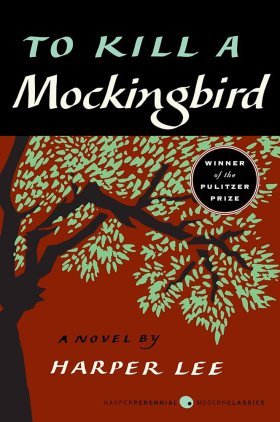I knew I had annoyed Miss Caroline, so I let well enough alone and stared out the window until recess when Jem cut me from the covey of first-graders in the schoolyard. He asked how I was getting along. I told him.
“If I didn’t have to stay I’d leave. Jem, that damn lady says Atticus’s been teaching me to read and for him to stop it-”
“Don’t worry, Scout,” Jem comforted me. “Our teacher says Miss Caroline’s introducing a new way of teaching. She learned about it in college. It’ll be in all the grades soon. You don’t have to learn much out of books that way—it’s like if you wanta learn about cows, you go milk one, see?”
“Yeah Jem, but I don’t wanta study cows, I-”
“Sure you do. You hafta know about cows, they’re a big part of life in Maycomb County.”
I contented myself with asking Jem if he’d lost his mind.
“I’m just trying to tell you the new way they’re teachin‘ the first grade, stubborn.
It’s the Dewey Decimal System.”
Having never questioned Jem’s pronouncements, I saw no reason to begin now.
The Dewey Decimal System consisted, in part, of Miss Caroline waving cards at us on which were printed “the,” “cat,” “rat,” “man,” and “you.” No comment
seemed to be expected of us, and the class received these impressionistic revelations in silence. I was bored, so I began a letter to Dill. Miss Caroline caught me writing and told me to tell my father to stop teaching me. “Besides,”
she said. “We don’t write in the first grade, we print. You won’t learn to write until you’re in the third grade.”
Calpurnia was to blame for this. It kept me from driving her crazy on rainy days, I guess. She would set me a writing task by scrawling the alphabet firmly across the top of a tablet, then copying out a chapter of the Bible beneath. If I reproduced her penmanship satisfactorily, she rewarded me with an open-faced sandwich of bread and butter and sugar. In Calpurnia’s teaching, there was no sentimentality: I seldom pleased her and she seldom rewarded me.
“Everybody who goes home to lunch hold up your hands,” said Miss Caroline, breaking into my new grudge against Calpurnia.
The town children did so, and she looked us over.
“Everybody who brings his lunch put it on top of his desk.”
Molasses buckets appeared from nowhere, and the ceiling danced with metallic light. Miss Caroline walked up and down the rows peering and poking into lunch containers, nodding if the contents pleased her, frowning a little at others. She stopped at Walter Cunningham’s desk. “Where’s yours?” she asked.
Walter Cunningham’s face told everybody in the first grade he had hookworms.
His absence of shoes told us how he got them. People caught hookworms going barefooted in barnyards and hog wallows. If Walter had owned any shoes he would have worn them the first day of school and then discarded them until mid-winter. He did have on a clean shirt and neatly mended overalls.
“Did you forget your lunch this morning?” asked Miss Caroline.
Walter looked straight ahead. I saw a muscle jump in his skinny jaw.
“Did you forget it this morning?” asked Miss Caroline. Walter’s jaw twitched again.
“Yeb’m,” he finally mumbled.
Miss Caroline went to her desk and opened her purse. “Here’s a quarter,” she said to Walter. “Go and eat downtown today. You can pay me back tomorrow.”
Walter shook his head. “Nome thank you ma’am,” he drawled softly.
Impatience crept into Miss Caroline’s voice: “Here Walter, come get it.”
Walter shook his head again.
When Walter shook his head a third time someone whispered, “Go on and tell her, Scout.”
I turned around and saw most of the town people and the entire bus delegation looking at me. Miss Caroline and I had conferred twice already, and they were looking at me in the innocent assurance that familiarity breeds understanding.
I rose graciously on Walter’s behalf: “Ah—Miss Caroline?”
“What is it, Jean Louise?”
“Miss Caroline, he’s a Cunningham.”
I sat back down.
“What, Jean Louise?”
I thought I had made things sufficiently clear. It was clear enough to the rest of us: Walter Cunningham was sitting there lying his head off. He didn’t forget his lunch, he didn’t have any. He had none today nor would he have any tomorrow or the next day. He had probably never seen three quarters together at the same time in his life.
I tried again: “Walter’s one of the Cunninghams, Miss Caroline.”
“I beg your pardon, Jean Louise?”
“That’s okay, ma’am, you’ll get to know all the county folks after a while. The Cunninghams never took anything they can’t pay back—no church baskets and no scrip stamps. They never took anything off of anybody, they get along on what they have. They don’t have much, but they get along on it.”
My special knowledge of the Cunningham tribe—one branch, that is—was gained from events of last winter. Walter’s father was one of Atticus’s clients. After a dreary conversation in our livingroom one night about his entailment, before Mr.
Cunningham left he said, “Mr. Finch, I don’t know when I’ll ever be able to pay you.”

























